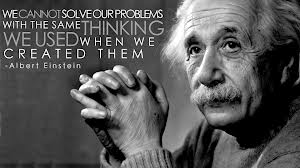Creative Thinking
 Have you ever thought that you were not very creative? Or you have thought you were creative but your creative ideas were impractical? In my psych 100 class we were learning about Erik Erikson’s psychosocial development. Erikson’s theory on development is that human beings tend to struggle between two critical concepts at every stage in life. For example, at 0-1.5 years, a child may either trust their caregiver (due to positive contact between the caregiver and the child) or express mistrust (due to neglect or negative experiences in this timeframe). In order to be able to become a stable and healthy individual, according to Erikson, one must pass each stage of development picking up the positive traits like trust, autonomy, identity…The reason I bring psychology into my blog this week, is to address the issue of how we view creativity and how creative we expect leaders to be.
Have you ever thought that you were not very creative? Or you have thought you were creative but your creative ideas were impractical? In my psych 100 class we were learning about Erik Erikson’s psychosocial development. Erikson’s theory on development is that human beings tend to struggle between two critical concepts at every stage in life. For example, at 0-1.5 years, a child may either trust their caregiver (due to positive contact between the caregiver and the child) or express mistrust (due to neglect or negative experiences in this timeframe). In order to be able to become a stable and healthy individual, according to Erikson, one must pass each stage of development picking up the positive traits like trust, autonomy, identity…The reason I bring psychology into my blog this week, is to address the issue of how we view creativity and how creative we expect leaders to be.
According to Erikson’s theory, from 3-6 years of age we struggle with the concepts of initiative v. guilt.( In this TED talk the speaker gives a great example in the beginning of the talk about his friend). At this stage of development a child must gain a sense of independence in order to proceed to the next level of development in a healthy manner. Another critical aspect of this stage, is a child’s eagerness for responsiility. In their search for responsibility they are exploring creative outlets like playing make-believe, coloring, or even playing with instruments. In order for her to grow in the right direction, it is the parent’s responsibility to confirm what her initiative is. For instance, if she decides to make the BIGGEST SAND CASTLE EVER it is up to the parent to encourage them and confirm that they can if they try. Because this task of building such a sandcastle may be near to impossible for a 3-6 year old, it is reasonable to doubt the little girl. However, if a parent tells the child this it can bring a sense of guilt and inhibit a child’s creative thinking process. Confirming initiative, allows them to hold a sense of responsibility and independence. If they are not given this chance, she instead grows up thinking that whatever she plans to do is always going to be wrong.
In some ways, as a society, we tend to label a depletion of creativity as growth in practical thinking. We also tend to value practicality over being imaginitave. Although practicality is needed in some situations, creativity plays a huge role in leadership. I believe it was once said that the definition of insanity is doing the same thing over and over again. It is creativity that inspires innovation. As we were studying this topic of creative thinking in psych, we used Einstein as an example of how creativity is found in geniuses. Today however, we tend to think creativity is not only impractical but also a sign of insanity.
In leadership, creativity is something we should not be afraid of exploring. I think it is also part of the members responsibilities to not downplay a creative idea as impractical. Granted there will be moments when a leader should be humble(or redirect himself to acknowledge her faults and be lead to humility) and see the situation she is in for what it is. Creativity is a key aspect of leadership, that leaders should not be afraid to express or explore 🙂
What are your views on leadership and creative thinking?
April 24th, 2013 at 11:14 am
Creative thinking is critical. It is therefore critical thinking and everyone knows that is important. It’s interesting in the world that we higher people with experience not people with creative thinking skills or critical thinking skills.